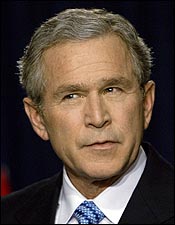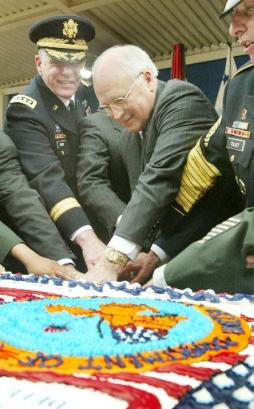
Welcome to how the Bush Empire handles public elections...
| Sat Aug 14,10:51 PM ET |
SIOUX CITY, United States (AFP) - President George W. Bush famously dislikes press conferences but has embraced "Ask President Bush" sessions packed with supporters at least as eager to pay tribute to him as get an answer.
|
"Mr President, I don't have a question. I've got three 'thank-yous'," one man told him at such an event in Ohio.
Billed as informal question-and-answer opportunities for curious voters to quiz the most powerful man in the world, the carefully choreographed campaign events usually recycle the central points from his stump speech.
"We're going to call on some of your citizens to help me make some points," he said at the Ohio event.
Bush's well-honed address includes a vow to appoint conservative judges, a defense of his tax cuts as promoting growth, and an emotional argument that going to war with Iraq was the right decision.
At an "Ask President Bush" in Oregon Friday, he was asked to appoint conservative judges; heard that his tax cuts promote growth; and received an emotional tribute from the sister-in-law of an Iraq-bound US soldier.
While he has yet to face a hostile questioner, angry attacks on Democratic White House hopeful John Kerry abound.
In Beaverton, Bush supporters accused the Massachusetts senator of having a "fuzzy memory", of winning two of his five Vietnam war medals for "self-inflicted scratches".
But would-be Bush hecklers face daunting obstacles: Loyalists handle giving out tickets to the event; home-made signs and banners are often forbidden; and in some cases access hinges on signing a loyalty oath.
"First priority goes to volunteers and supporters and then we reach out to people who are undecided and want to hear what the president has to say," according Bush campaign spokesman Scott Stanzel.
The result is a friendly crowd eager to see the candidate they hope will win the November 2 election, while authorities banish protesters to heavily policed sidewalks blocks away.
In fact, the only question that left Bush briefly at a loss for words in Oregon came from a child who stumped him by asking why a school superintendent who "makes 200,000 dollars" would fire the school librarian.
"I can't answer your question why. But (First Lady) Laura (Bush) was a librarian, so maybe the superintendent ought to talk to the librarian, Laura. But, no, I don't know," the president said.
Another child, however, had a more campaign-friendly question -- "Mr president, as a child how can I help you get votes?" -- and received a more confident answer.
"First, you can put signs up in people's yards who want the signs in their yards," said Bush, who urged the tot to find a friend with a sibling over the minimum voting age of 18.
"Say to them, register to vote, and then please do me a favor, vote on my behalf for George W. Bush," said the president, who won laughter from his hand-picked audience.


















